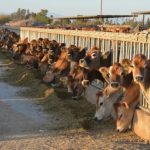
Dairy farming is under increasing pressure for its environmental impact, consuming vast resources and emitting methane— a greenhouse gas far more potent than CO₂.
As the food industry searches for lower-carbon alternatives, Boston-based startup Brown Foods is preparing to showcase UnReal Milk, the world’s first lab-grown whole cow’s milk— produced without a single cow.
According to its founders, UnReal Milk is produced using mammalian cell culture— replicating the nutrition, taste, and texture of traditional dairy. It can be processed into butter, cheese, and ice cream, offering a lower-carbon, cruelty-free alternative to conventional milk. Brown Foods claims its production method slashes carbon emissions by 82%, water use by 90%, and land use by 95%, without relying on livestock.
The company sees its technology as a way to mitigate many of dairy’s long-standing issues.
“The future of food faces significant challenges,” says Sohail Gupta, Co-founder and CEO of Brown Foods, who founded the startup in 2021 alongside Bhavna Tandon, and Avhijeet Kapoor.
“When it comes to dairy, cattle farming accounts for 30% of global methane emissions, while supply chain adulteration remains a major problem. Additionally, cattle farming depends on optimal climatic conditions, and milk production cannot be easily regulated— as seen during COVID-19, when supply chain disruptions made it impossible to simply pause milk production. UnReal Milk aims to address these challenges by providing a scalable, animal-free, and sustainable alternative, leveraging technology to offer a safer and more controllable dairy solution.”
Gupta says it took his team just three years to achieve what other startups have been working on for more than double the time. The startup secured $2.36 million in seed funding from investors including Y Combinator, AgFunder, SRI Capital, Amino Capital, and Collaborative Fund. Operating in both the U.S. and India, the company is now moving toward commercialization.
The first version of UnReal Milk is already undergoing lab validation. Independent testing from the Whitehead Institute for Biomedical Research, affiliated with MIT, confirmed the presence of all essential dairy proteins, making the product structurally identical to traditional milk. Brown Foods has also confirmed that UnReal Milk contains the same milk fats, primarily triglycerides, and carbohydrates found in conventional dairy.
“Brown Foods has achieved a significant scientific and technological breakthrough by producing the world’s first test tube of lab-grown milk,” affirms biopharmaceutical manufacturing expert Dr. Richard Braatz, who is a Professor of Chemical Engineering at MIT and serves on Brown Foods’ Scientific Advisory Board.
Lab-Grown Dairy Gaining Momentum
Rising greenhouse gas emissions, deforestation, and water scarcity linked to traditional animal agriculture have spurred innovation in plant-based, fermentation-derived, and lab-grown proteins. With increasing investment and technological advancements, these alternatives are rapidly moving from niche products to mainstream options.
In the lab-grown space, meat has dominated the spotlight, securing $2 billion in investments in 2022 and USDA approval in 2023, but lab-grown dairy is still carving out its place in the market. According to The Insight Partners, the dairy alternatives sector is on track to expand from $31.13 billion in 2023 to $70.60 billion by 2031. Some analysts project that animal-free dairy could eventually capture up to 33% of the $893 billion traditional dairy market.
Investment in the sector is accelerating. Venture funds like Agronomics, which backs lab-grown meat, dairy, leather, and even chocolate, has reported a 23% gross IRR, while Cult Food Science has invested in 18 companies in the space, including Eat Just, the first company to commercialize lab-grown meat in Singapore (2020). In December 2024, Swiss food giants launched The Cultured Hub, a biotech facility focused on scaling cellular agriculture, including lab-grown dairy.
Startups like Remilk and Perfect Day are using precision fermentation to produce dairy-identical proteins without relying on cows, offering an alternative approach to traditional dairy production.
Yet, challenges remain. In June 2023, the National Milk Producers Federation urged the FDA to ban precision fermentation startups from labeling their products as “milk”, citing regulatory standards. Meanwhile, some farmers see lab-grown dairy as a competitive threat, and it remains unclear whether consumers will fully embrace these innovations or if they will remain a niche alternative.

Employees of French startup Standing Ovation work in a Paris laboratory on October 11, 2023, … [+]
AFP via Getty Images
World’s First Lab-Grown Whole Cow’s Milk
Unlike precision fermentation, which produces only select dairy proteins, UnReal Milk is created using mammalian cell culture, producing a complete milk composition. This method ensures that UnReal Milk can be transformed into butter, cheese, and ice cream without additives or restructuring, making it a closer alternative to traditional dairy. This approach also offers a viable path to mass-producing milk in a way that is both resource-efficient and sustainable, with the potential to scale to meet global dairy demand without reliance on livestock.
Dr. Braatz underscores the significance of this approach: “Unlike precision fermentation, the key strength of Brown Foods’ technology approach is that it uses mammalian cell culture which enables them to produce all components of milk together as whole milk and their technology can be scaled up further using bioreactor systems to produce mass volumes of milk for the human consumption. What makes this breakthrough remarkable is its scalability. This technology can be scaled to meet global demand while delivering a solution that is sustainable and resource-efficient.”
According to Gupta, this approach will enable Brown Foods to produce any amount of milk, anywhere in the world, irrespective of climate and geography, without depending on animal farming.
Efforts to produce milk without cows are taking various forms. Senara, a German startup, is growing cell-cultured mammary cells in partnership with dairy farmers, blending biotechnology with traditional milk production. Wilk, an Israeli venture, focuses on producing cultured milk fats, used in making cheese and yogurt. These approaches contrast with UnReal Milk, which is taking a fully lab-based route, aiming to replicate whole cow’s milk without relying on livestock or traditional dairy systems. For Brown Foods, the goal is not just to mimic dairy but to recreate it at a molecular level.
“We had to learn from basic biology of the cow and we have tried to stay as close to nature as possible throughout our work,” Gupta explains.
Brown Foods positions UnReal Milk as a complete dairy solution— no cows required— differentiating itself from hybrid models. Unlike its competitors, UnReal Milk is fully lab-grown, created through bioreactor-grown milk-producing cells that naturally generate proteins, fats, and carbohydrates— replicating cow’s milk at a molecular level. Rather than supplementing traditional dairy, UnReal Milk is designed as a true alternative— without cows.
With a validated proof of concept, Brown Foods is now refining its production process. Currently, UnReal Milk is extracted from a liquid growth medium, but future iterations will remove all residual traces of this solution for a purer final product. To accelerate development, the company is integrating AI-driven bioprocessing, optimizing efficiency and precision for scalable, cost-effective production.

Bhavna Tandon showcasing the world’s first test tube of lab-grown milk
Mark Wilson on behalf of Brown Foods
As the first company to publicly showcase lab-grown whole cow’s milk, Brown Foods is positioning itself as a key player in the growing cellular agriculture sector. While regulatory approval and consumer acceptance remain challenges, advancements in mammalian cell culture and AI-driven bioprocessing could open the door to large-scale production.
With taste tests planned for 2025 and a market pilot set for 2026, the company’s progress will be closely watched as the food industry explores alternatives to traditional dairy. But for co-founder Sohail Gupta, the vision extends far beyond replicating cow’s milk.
“Though we are starting with cow milk, using our technology we can produce milk of any mammalian species, including human milk,” says Gupta, hinting at potential plans for the future.
“The market potential extends beyond milk, to butter, cheese, yogurt, and even non-food industries like pharmaceuticals and cosmetics, where dairy ingredients play a role. Long term, this technology isn’t just about the earth— it’s about food security anywhere, whether in extreme climates, disaster-stricken areas, or even space travel. We are just getting started.”
You can now read the most important #news on #eDairyNews #Whatsapp channels!!!
🇺🇸 eDairy News INGLÊS: https://whatsapp.com/channel/0029VaKsjzGDTkJyIN6hcP1K

























